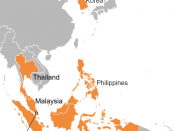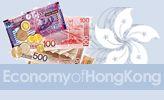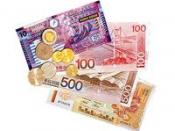I. IntroductionThe financial crisis in the Asian economies in 1997 has created tremendous interests in the economic point of view. This report focuses on the economic situation of Hong Kong in 1997-98, which has some very special features among the economies in the region.
In the Asian Financial Crisis, the economy in Hong Kong did not sufferer from any banking or currency crisis like some of the Asian countries such as Indonesia, Malaysia, South Korea and Thailand, which their troubles began with a severe depreciation in their currencies. This triggered capital outflow and bankruptcy of many financial intermediaries and firms. The currencies of these countries have long been maintained at a relatively constant rate with the US dollar until 1995. Their depreciation is due to the central banks were unable to defend speculative attacks.
Regarding to this, the government of the Hong Kong Special Administrative Region of the People's Republic of China successfully supported the currency by paying the cost of having high interest rates.
Hong Kong dollar is pegged with the US dollar, at a rate of HK$7.8 to US$1 since 1983. This is due to the effort of the Hong Kong Government and the Hong Kong Monetary Authority (HKMA), the central bank of the Hong Kong. However, the economy is expected to enter one of the most severe recessions in the post-war period after the Asian Financial Crisis.
Section 2 in this paper will offer background information of the Linked Exchange Rate System. It defines how the monetary authorities defend the currency peg. Section 3 will summarize on how and why the Hong Kong dollar was under speculative attacks during the Asian Financial Crisis. Section 4 is a postscript on how the HK government reacts to the situation and the actions that was taken.
II. The Background of...


